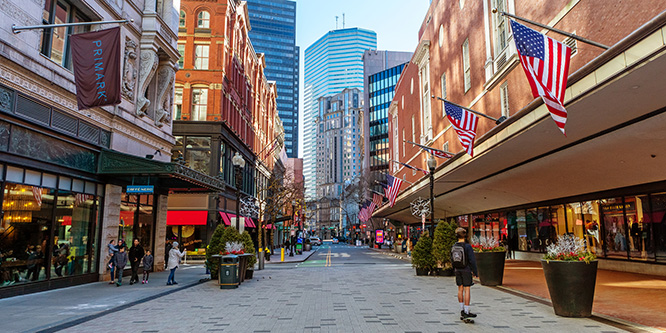
Photo: iStock | APCortizasJr
Restaurants Have Come Back in Boston. Why Not Retail Stores?
As public concern over COVID-19 infection continues to fade into the background in the U.S. and people return to their pre-pandemic routines, cities are still getting back on their feet. A recent feature on Marketplace finds, however, that even as customer foot traffic picks up, the downtown of one major U.S. city is experiencing an uneven rebound with restaurants doing better than ever as retail stores continue to struggle.
Office workers, tourists, construction workers and others have been filling Boston’s downtown across day parts for food, entertainment and opportunities to socialize, according to Marketplace, but shopping in the area has not proven so popular.
The number of restaurants and bars in the area is now 10 percent greater than before the pandemic by the estimate of Michael Nichols, president of the Downtown Boston Business Improvement District. The bounce back of adjacent retail continues to lag, however, with twice as many retail vacancies as before the pandemic.
Mr. Nichols said fewer office workers in the downtown area has contributed to the struggles of clothing stores and tailors.
Changing retail real estate trends could also be behind some vacancies. The disruption of the pandemic has led to more retailers being likely to seek short-term leases and more landlords being amenable to granting them.
While restaurants are booming in Boston, not every account of the restaurant industry paints so rosy a post-pandemic picture.
A Restaurant Finance Monitor webinar, reported by Yahoo! Finance, points to New York City restaurants taking a bottom line hit as hybrid work models cut down on office workers in some neighborhoods.
Discussion Questions
DISCUSSION QUESTIONS: Are other American cities experiencing the same situation as Boston, where restaurants are up and retail is down? What do retailers operating in areas with fewer office workers need to do to remain viable?


Throughout the pandemic and through today, we at Cambridge Retail Advisors have been volunteering our time to support independent restaurants and retailers through generous grants from the Boston Main Streets Foundation, Citizens Bank, BOA, and the Massachusetts Growth Capital Corporation. This has allowed these businesses to stay open despite the COVID-19 challenge. The city center retail has been slow to recover for a few reasons. One being fewer workers back to the office and another being the economy. People are enjoying the social benefits of post-pandemic life, and I see this trend continuing as the new normal.
For brands with multiple retail locations, especially in metro areas like Boston, shoppers can usually opt to visit a store outside the city. But restaurants, especially when they’re unique to the area, are destinations. You can leave the suburb for lunch or dinner in Boston and stop to shop closer to home. It’s good news that the appeal of more authentic, local, independent retailers is growing. Expect the retail shops to catch up with the restaurants as they all continue to grow.
As for empty office space, look at Chicago’s Catalog at Willis Tower (formerly Sears Tower). There, they’ve filled empty office space with a combo of retail, restaurants, and entertainment. I wonder how the business at retail and restaurant brands—not all big chains, by the way—is faring there.
I know that the same trend is happening in our much smaller city of 136,000. More unique restaurants appear to appeal more to consumers than more of the same stores. Additionally, the pandemic has done two things: it has ingrained the idea of shopping online as very convenient in many cases and it has created pent up demand to get out and socialize which is manifested in dining out.
Miami here. Tourist towns like Miami are just different, and I’ve lived in both Boston and Miami. While neither city is particularly easy to drive around in, when people come to tourist towns on vacation and weather is sub-optimal (like today), shopping is the logical choice. That’s why, I guess, we have so many malls.
Boston is just finishing its winter, and tourist season is just beginning. Let’s give it a few beats and see how it all looks in October/November. By then, we will have gone through spring, summer, and leaf peeping season.
There aren’t a whole lot of hard facts here – “estimates” and vague ratios (e.g. “twice as many”) – so let’s concentrate on the ones we’ve long had: downtowns have been losing their importance as retail centers for three quarters of a century (the picture at the top of macy*s is DB’s sole remaining department store, even twenty years ago there were two). So while the Pandemic may have made things worse, probably not a whole lot, for the simple reason that there was very little left to lose. And, again, before was a moving number since these centers were on a long-term decline.
As for what retailers (who were dependent on office workers) can do when those workers don’t come back: sadly, I don’t think there’s much hope; there will be all kinds of (meant-to-be) hopeful stores about repositioning and online sales and “becoming a destination”, but when your business model has 500 people a day coming by for something, and that number suddenly drops to 83, your options are small.
When we’re in New Hampshire we will never go to Boston for shopping. Why? Because traffic is a nightmare and it’s expensive and annoying to park. Viable public transport from NH is non-existent. And the selection of stores is reasonable, but not great. If want to shop we will go to the malls in Natick or Burlington, both of which are convenient and have a great choice of shops. However, we’ll happily go to Boston to see friends or for a day out – both of which activities will including dining out. This probably holds true for a lot of people who live in the surrounding areas of Boston. It’s just not a magnet for shopping.